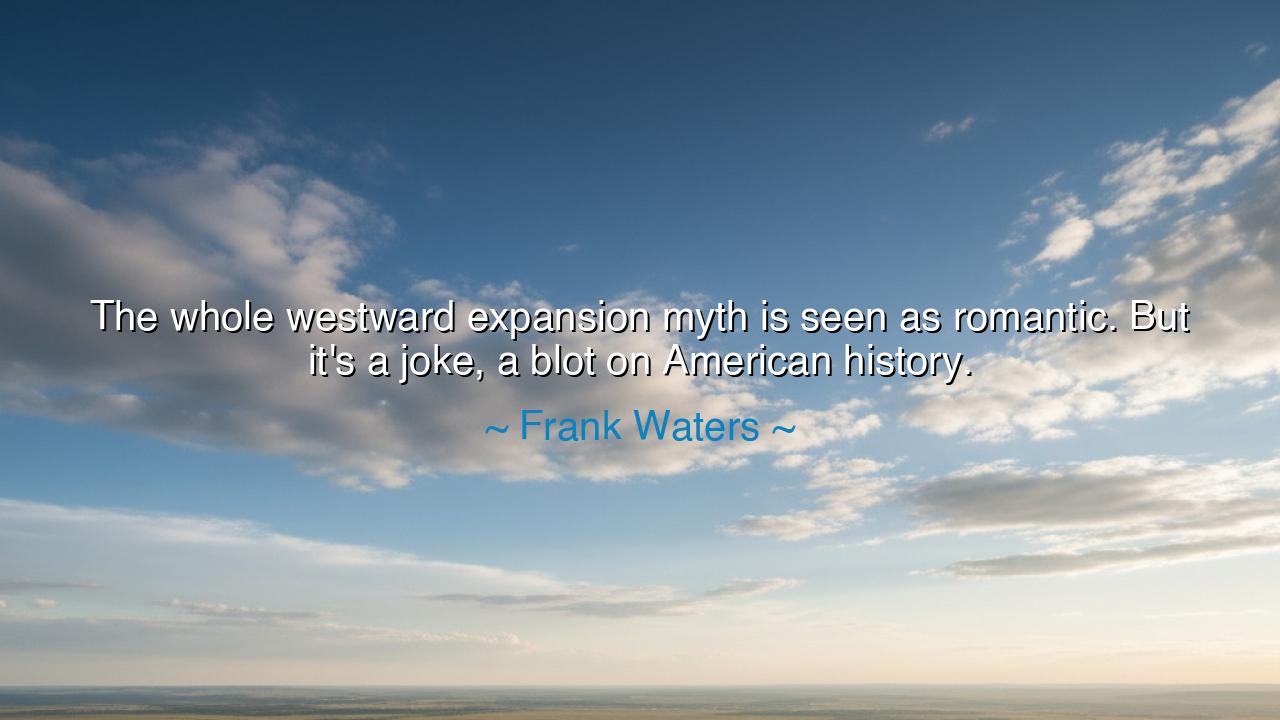
The whole westward expansion myth is seen as romantic. But it's a
The whole westward expansion myth is seen as romantic. But it's a joke, a blot on American history.






Hearken to the words of Frank Waters, who in truth and sorrow declared: “The whole westward expansion myth is seen as romantic. But it’s a joke, a blot on American history.” In this statement lies a shattering of illusions, a stripping away of the glittering mask that story-tellers have long placed over violence and conquest. For generations, the tale of pioneers riding into the sunset was sung as if it were noble, bold, and heroic. Yet beneath that tale lies the groan of dispossession, the cry of nations erased, and the silent witness of the earth itself, scarred and torn.
The origin of this myth rests in the 19th century, when the doctrine of Manifest Destiny was raised like a banner. The idea was simple but terrible: that the United States was fated—by Providence, by right, by might—to spread from the Atlantic to the Pacific, consuming all lands in its path. To make this bitter march palatable, poets and politicians cloaked it in the garments of romance. The wagon trains became symbols of courage. The cowboy became the knight of the new world. The conquest of vast prairies was painted as progress, not as plunder. Yet Waters, with piercing eyes, saw through the veil.
Consider the story of the Trail of Tears. The Cherokee people, though they had adopted many practices of European settlers, were forced from their ancestral homelands in the 1830s. Promised justice, they received betrayal; promised safety, they endured death. Thousands perished as they were driven westward in chains of law and gun. And yet, in schoolbooks and pulp novels, the westward push was sung as triumph, a march of civilization. This is the “romance” Waters calls a joke—a grotesque masquerade that mocks the suffering of the displaced.
Even the land itself bears witness. Forests cleared, rivers dammed, herds of buffalo slaughtered until only remnants remained. What was once abundance became scarcity, what was once harmony between people and place became extraction and desecration. And still, the myth endured: paintings of noble settlers gazing bravely toward the horizon, as if their courage erased the cost. But true courage, as Waters reminds us, does not lie in conquest—it lies in truth, in facing the weight of history without turning away.
Yet we must not only mourn; we must learn. Waters speaks not to condemn blindly, but to awaken. To acknowledge that the westward expansion was not simply a story of boldness, but also one of greed, arrogance, and loss. And in this acknowledgment lies the possibility of redemption. For when we name the blot, we refuse to let it remain hidden. When we strip away the false romance, we make room for honesty, for healing, for remembrance of those silenced voices.
The lesson is clear: beware of myths that flatter power and disguise injustice. Beware of stories that are too neat, too glorious, too triumphant, for they may be woven not from truth, but from the threads of denial. Instead, seek the deeper story—the voices of the oppressed, the record of the land, the wisdom that lies in sorrow as well as in celebration. For only by seeing the whole truth can a people walk forward with integrity.
Therefore, children of tomorrow, when you hear tales of conquest, of victory, of progress, pause and ask: Whose voices are missing? Who paid the price? Let Waters’ words remind you that history must not be swallowed whole, but tasted with discernment. Romantic illusions may comfort, but truth—though bitter—nourishes the spirit. And so let us choose truth, let us honor memory, let us tell the story not only of those who conquered, but of those who endured.
Thus the words of Frank Waters become a guiding fire: to unmask false romance, to call a joke what is cruel, and to mark upon our memory the blot of injustice—not to dwell in shame, but to rise wiser, more humble, and more just.






AAdministratorAdministrator
Welcome, honored guests. Please leave a comment, we will respond soon